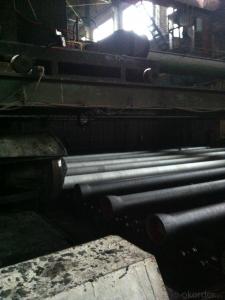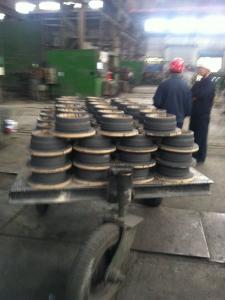DUCTILE IRON PIPES AND PIPE FITTINGS K9 DN450
- Loading Port:
- Tianjin
- Payment Terms:
- TT OR LC
- Min Order Qty:
- 25 m.t
- Supply Capability:
- 30000 m.t/month
OKorder Service Pledge
OKorder Financial Service
You Might Also Like
Material : Ductile Cast Iron
Size Range : DN 80mm to DN 2000mm
Unit Effective Length : 6m or 5.7m
Manufacture Standard: ISO 2531:1998/ EN 545:2006/EN 598:2007
Annual capacity : 200,000 tons
Coating Exterior: Zinc 130g/m2 according to ISO 8179-1 and bitumen coating 70 microns.
Cement Interior: Portland Cement/ High Alumina Cement/ Sulphate Resisting Cement Lining according to ISO 4179
Special requirements on external coating and internal lining can be applied
We also provide accessories such as SBR/EPDM rubber gaskets, lubricant paste, pipe caps, PE sleeves, etc.
Additional Parts:
Each pipe is strictly inspected according to related standard to ensure permanently high performance.
Easy Installation at site and service free for life
Long Service Lifespan
Quotation will arrive you within 24hours once we get your inquiry.
We guarantee offering you a competitive price.
A copy of original inspection reports of pipes will be offered after shipment.
Photos of loading process will be sent to the customer after shipment effect.
We will follow-up the delivery progress after shipment effect and update to the customer on weekly basis.
- Q:What is the cost of ductile iron pipes compared to other pipe materials?
- The cost of ductile iron pipes can vary depending on various factors such as size, length, and supplier. However, in general, ductile iron pipes tend to be more expensive compared to other pipe materials such as PVC (polyvinyl chloride) or steel. This is mainly due to the manufacturing process and the inherent qualities of ductile iron that make it a durable and reliable choice for various applications. Ductile iron pipes are known for their high tensile strength, resistance to corrosion, and durability, making them suitable for carrying potable water, wastewater, and other fluids under high pressure. The production process of ductile iron involves adding magnesium to cast iron, which results in improved strength and flexibility. This additional process, along with the quality of the material, contributes to the higher cost. On the other hand, pipes made from materials like PVC or steel can be less expensive. PVC pipes are lightweight, easy to install, and relatively inexpensive, making them a popular choice for low-pressure applications such as irrigation or drainage systems. Steel pipes, known for their strength and durability, are often used in high-pressure applications but come at a higher cost than PVC. Ultimately, the cost of ductile iron pipes may be higher initially, but their longer lifespan and reliability can offset the investment over time. Additionally, factors such as the specific project requirements, local regulations, and availability of materials can also influence the overall cost comparison between ductile iron pipes and other pipe materials.
- Q:How do ductile iron pipes handle thermal cycling in industrial applications?
- Ductile iron pipes are renowned for their exceptional ability to withstand thermal cycling in industrial applications. Thermal cycling refers to the fluctuation in temperature that occurs during the operation of various industrial processes. These pipes are designed to endure the stresses caused by thermal expansion and contraction, thus making them highly suitable for environments with significant temperature variations. One of the noteworthy features of ductile iron pipes is their remarkable thermal conductivity. This means that they efficiently dissipate heat from the hot areas, thereby minimizing the impact of thermal cycling. Furthermore, ductile iron pipes have a low coefficient of thermal expansion, which means that they expand and contract at a slower rate compared to other materials. This characteristic helps to reduce the stresses imposed on the pipes during thermal cycling. Moreover, ductile iron pipes exhibit excellent mechanical properties, including high tensile strength and impact resistance. These properties enable the pipes to withstand the mechanical stresses that may arise due to thermal cycling. They can resist the development of cracks or fractures, ensuring the integrity and durability of the pipes in industrial applications. Additionally, ductile iron pipes possess a high resistance to corrosion and oxidation. This is particularly crucial in industrial settings where the pipes may be exposed to aggressive chemicals or harsh environments. The corrosion resistance of ductile iron pipes ensures that they can endure the corrosive effects of process fluids and gases, even during thermal cycling. In conclusion, ductile iron pipes are well-equipped to handle thermal cycling in industrial applications. Their high thermal conductivity, low coefficient of thermal expansion, excellent mechanical properties, and resistance to corrosion make them a reliable choice for environments with significant temperature variations. These pipes effectively withstand the stresses caused by thermal cycling, guaranteeing their durability and longevity in industrial settings.
- Q:How does ductile iron pipe compare to PVC pipe in terms of performance and cost?
- Ductile iron pipe and PVC pipe have different characteristics in terms of performance and cost. Ductile iron pipe is known for its strength, durability, and ability to withstand high pressure and heavy loads, making it ideal for applications that require robust performance such as water distribution systems. On the other hand, PVC pipe is lightweight, corrosion-resistant, and more flexible, making it suitable for above-ground and non-pressurized applications like drainage systems. In terms of cost, PVC pipe is generally less expensive than ductile iron pipe, especially for smaller diameter pipes. However, as the diameter increases, ductile iron pipe becomes more cost-effective due to its superior strength and longer lifespan, which reduces maintenance and replacement costs over time. Ultimately, the choice between ductile iron and PVC pipe depends on the specific application, budget, and desired performance characteristics.
- Q:How to analyze and judge the quality of ductile iron pipe
- The quality of water supply pipe ductile is a topic worthy of discussion, how to judge the quality of the ductile iron pipe, ductile now on the market is all kinds of pipe, a name sand type ductile iron pipe, ductile water-cooling tube, K8 grade K9 grade ductile iron pipe, ductile iron pipe, also the brand is divided into ductile ductile pipe pipe, big brands, and some well-known manufacturers of producing ductile pipe,
- Q:What is the expected hoop stress capacity of ductile iron pipes?
- The expected hoop stress capacity of ductile iron pipes can vary depending on various factors such as the pipe's diameter, wall thickness, and material grade. However, in general, ductile iron pipes have a high level of strength and durability, making them capable of withstanding significant hoop stress. Ductile iron pipes are designed and manufactured to meet specific standards and requirements, such as the American Water Works Association (AWWA) C151 and C115 standards. These standards ensure that the pipes have sufficient strength to handle the anticipated loads and pressures they may encounter during their service life. The hoop stress capacity of ductile iron pipes is primarily determined by their tensile strength. Ductile iron is a type of cast iron that has been treated to exhibit ductility, meaning it can withstand tensile stress without fracturing. This property makes it suitable for applications where the pipes may experience internal or external pressure, such as water distribution systems or sewer lines. To determine the expected hoop stress capacity, engineers typically perform calculations based on the specific pipe dimensions, material properties, and the expected operating conditions. These calculations consider factors such as the internal pressure, external loads, and the safety factors required by the applicable design standards. It is important to note that the expected hoop stress capacity of ductile iron pipes should always be verified using the manufacturer's specifications and engineering calculations. Additionally, any modifications or repairs to the pipes should be performed by qualified professionals in accordance with industry guidelines to ensure their continued strength and performance.
- Q:How does ductile iron pipe perform in areas with high soil contamination?
- Ductile iron pipe performs well in areas with high soil contamination due to its inherent strength and corrosion resistance. Its durable and robust nature allows it to withstand the chemical and physical challenges posed by contaminated soil. Additionally, its smooth interior surface minimizes the accumulation of debris and sediment, reducing the chances of blockages and maintaining efficient flow. Overall, ductile iron pipe is a reliable choice for areas with high soil contamination, providing long-lasting and dependable performance.
- Q:How does ductile iron pipe perform in areas with high soil settlement?
- Ductile iron pipe has gained a reputation for its exceptional performance in regions where soil settlement is significant. Thanks to its inherent strength and durability, it remains structurally intact under the pressures exerted by settling soil. The ductile iron pipe's flexible nature enables it to accommodate ground movements caused by soil settlement, thereby reducing the risk of pipe failure or damage. Its adaptability to these movements helps prevent cracks, leaks, and breaks that may occur in more rigid pipe materials. Furthermore, the strong resistance of ductile iron pipe to corrosion provides an additional advantage in areas with high soil settlement. It can withstand the corrosive effects of the soil and other environmental factors, ensuring the pipe system's longevity and reliability. In regions with substantial soil settlement, ductile iron pipe is often the preferred choice due to its ability to handle ground movements without compromising performance. Its strength, flexibility, and corrosion resistance make it an ideal solution for maintaining a robust and efficient water distribution system, even in challenging soil conditions.
- Q:Are ductile iron pipes suitable for use in power plants?
- Yes, ductile iron pipes are suitable for use in power plants. They possess excellent mechanical properties, such as high strength, durability, and impact resistance, making them suitable for transporting water, steam, and various chemicals in power plant applications. Additionally, their corrosion resistance and ability to withstand high temperatures make them a reliable choice for conveying fluids in power generation facilities.
- Q:Are ductile iron pipes resistant to soil movement?
- Yes, ductile iron pipes are resistant to soil movement. Ductile iron pipes have a high tensile strength, which allows them to withstand external forces such as soil movement. These pipes are designed to be flexible and are able to absorb and distribute stresses caused by ground settlement or other forms of soil movement. Additionally, ductile iron pipes have a strong and durable construction that can resist the compressive forces exerted by the surrounding soil. Overall, ductile iron pipes are a reliable and resilient choice for underground pipelines, providing long-term stability and resistance to soil movement.
- Q:Can the underground cast iron pipes be connected with clamps to form buttress?
- Best not to, because the use of clamp connection way to connect the poor integrity of the pipeline, the base treatment is not in place or uneven settlement, it is easy to produce deformation, resulting in pipe bending deformation, easily leaked from the junction.
1. Manufacturer Overview |
|
|---|---|
| Location | |
| Year Established | |
| Annual Output Value | |
| Main Markets | |
| Company Certifications | |
2. Manufacturer Certificates |
|
|---|---|
| a) Certification Name | |
| Range | |
| Reference | |
| Validity Period | |
3. Manufacturer Capability |
|
|---|---|
| a)Trade Capacity | |
| Nearest Port | |
| Export Percentage | |
| No.of Employees in Trade Department | |
| Language Spoken: | |
| b)Factory Information | |
| Factory Size: | |
| No. of Production Lines | |
| Contract Manufacturing | |
| Product Price Range | |
Send your message to us
DUCTILE IRON PIPES AND PIPE FITTINGS K9 DN450
- Loading Port:
- Tianjin
- Payment Terms:
- TT OR LC
- Min Order Qty:
- 25 m.t
- Supply Capability:
- 30000 m.t/month
OKorder Service Pledge
OKorder Financial Service
Similar products
New products
Hot products
Related keywords


























